Emma has placed her doll Flora against the pillow. She says, "Now, dear Flora, I want you to be very good to-morrow, for I am to have company. It is my birthday."
Project Gutenberg's The Nursery, October 1877, Vol. XXII. No. 4, by Various
This eBook is for the use of anyone anywhere at no cost and with
almost no restrictions whatsoever. You may copy it, give it away or
re-use it under the terms of the Project Gutenberg License included
with this eBook or online at www.gutenberg.org
Title: The Nursery, October 1877, Vol. XXII. No. 4
A Monthly Magazine for Youngest Readers
Author: Various
Release Date: February 20, 2009 [EBook #28138]
Language: English
Character set encoding: ISO-8859-1
*** START OF THIS PROJECT GUTENBERG EBOOK THE NURSERY, OCTOBER 1877 ***
Produced by Emmy, Juliet Sutherland and the Online
Distributed Proofreading Team at http://www.pgdp.net. Music
by Linda Cantoni.

| PAGE | |
| The Parrot that played Truant | 97 |
| Feeding the Ducks | 100 |
| Chestnut-Gathering | 104 |
| A Day with the Alligators | 107 |
| The Spider and her Family | 110 |
| Why Uncle Ralph did not hit the Deer | 113 |
| Faithful Dandy | 114 |
| Emma and her Doll | 117 |
| Our old Billy | 119 |
| The Thrush feeding the Cuckoo | 120 |
| The Cat and the Starling | 125 |
| PAGE | |
| A Baby Lay | 101 |
| The Pigs | 106 |
| How to draw a Goose | 112 |
| Learn your Lesson | 116 |
| Jippy and Jimmy | 122 |
| The jolly old Cooper | 123 |
| The Express Package | 126 |
| The White Owl (with music) | 128 |
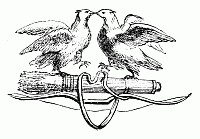
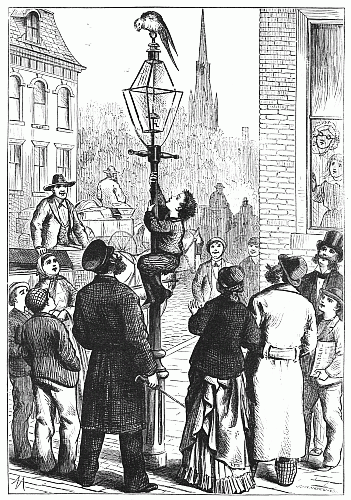 THE PARROT THAT PLAYED TRUANT.
THE PARROT THAT PLAYED TRUANT.
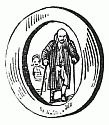
But one day, when the window was open, and the door of the cage was open also, Polly thought it was a good time to play truant. So she hopped out, rested on the sill a moment, and then flew into the street, from tree to tree, and from lamp-post to lamp-post.
Poor Miss Dorothy was in despair. How should she get back her lost pet? She called in a policeman, and he advised her to get out a handbill, offering a reward. So in an hour this notice was pasted on the walls near by:—
LOST!—A green-and-white parrot. It answers to the name of Polly, and can talk quite plainly. It says, "Boy, go away!" also, "Polly wants a cracker," and "No, you don't!" Any one finding this bird shall, on returning it to its afflicted owner, Miss D. Draper, No. 10, Maiden Place, receive a reward of two dollars.
Little Tony Peterkin was walking home from school, and wishing he had money enough to buy a copy of Virgil without going to his mother for it,—for she was a widow, and poor,—when he saw a man pasting this handbill on a wall. Tony read it, and said aloud, "Oh, I wish I could find that parrot!"
A girl who heard him said, "I saw a parrot just now on one of the trees in Lake Street."—"Did you?" said Tony; and off he ran. The parrot had flown from the tree[99] to the top of the lamp-post; and when Tony got there, two women, a newsboy, and a policeman were looking up at the strange fowl.
It was the work of a second for Tony to spring at the iron post, and begin climbing up. "No, you don't!" cried the parrot. That frightened Tony, so that he almost dropped; but he took heart when he thought of the two dollars and a new fresh copy of Virgil.
Up he climbed; but just as he was going to put his hand on the little cross-bar under the lamp, "Boy, go away!" cried Poll. Tony's heart beat at these words; but he held on. "Poll, Poll, pretty Poll!" cried he: "come and get a cracker!"—"Polly wants a cracker," replied the bird.
The truth was, Polly was tired of the street, and wanted to get back to Miss Dorothy. So, when Polly heard Tony's kind words, she flew down to the cross-bar, and, when he held out his hand, she lighted on it, and Tony slid with her down the post to the ground.
"Well done, my lad," said the policeman. He went with Tony, carrying the bird, to No. 10, Maiden Place; and Miss Dorothy was so much pleased that she gave Tony three dollars instead of two. On his way home he bought that copy Of Virgil.
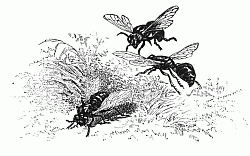
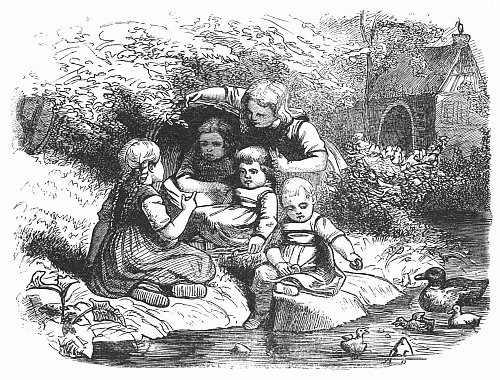
A mild summer day, and one, two, three, four children sitting on the ground by the pond, and feeding the ducks!
But I think I hear the larger girl, who is standing up, say to the sitters, "Children, don't you know better than to sit there on the damp earth? You will every one of you catch a cold. Get up this instant."
That is what the larger girl ought to say; for many children take bad colds by sitting on the grass. The other day, as I went through the Central Park in New York, I saw a maid in charge of three children, one of them an infant, and she was letting them lie at full-length on the grass.
I told her she must not do so; but she said the weather was warm, and there was no danger. As I knew the parents of the children, I told her she must take the children up at once, and let them sit on the seats near by.[101]
At length she obeyed me. Two days afterwards I called on the parents of the children, and then learned that every one of the little ones was ill with a cold. I told the mother what I had seen at the Central Park and she told the maid that never again must she let the children sit on the bare grass. The maid promised she would not do so again.
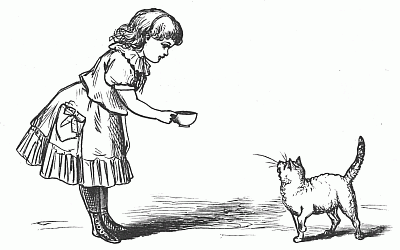
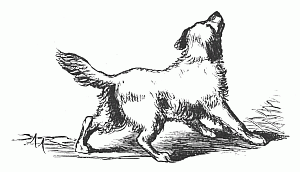
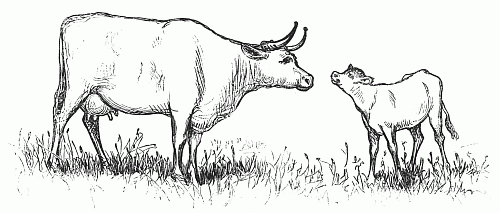
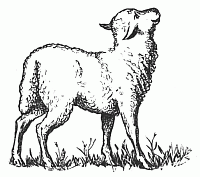
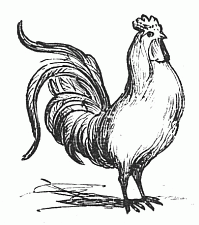
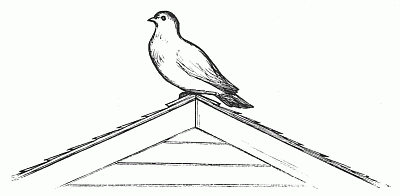
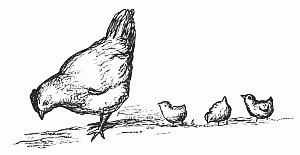
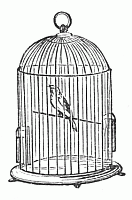
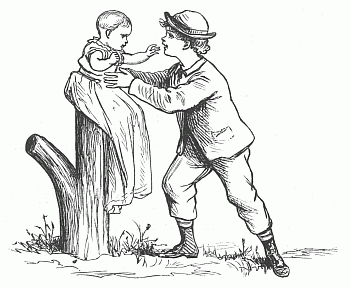
Did you ever go chestnut-gathering? Such fun as it is! especially when a lot of girls and boys go together.
On one of my father's farms there were many chestnut-trees; and every autumn, after the first frost, when the leaves were all turning, and beginning to fall, we used to have chestnut-gatherings.
The boys used to get long poles, with which they would beat off the nuts. Sometimes they would climb the trees, and shake or beat off such nuts as they could not reach from below. And we girls used to help pick them up, and put them into baskets.
Some years chestnuts are very scarce. I remember one year there was only one tree that had any nuts on; and we could not reach them: not even a man could climb it.
One day, Henry, who was a very kind man, said, "Perhaps we will cut that tree down: it will make good rails, and then you children can get all the nuts."
We no sooner heard this than we gave him no peace till it was done. And such an event! For we were to see the tree cut down.
We children were stationed far away from danger; and another man and Henry chopped and chopped, till it was almost ready to fall, when they stepped back, and, in less than a minute, there was such a whistling through the air, such a crashing, and breaking of branches, and then a loud thud!
The tree was down. I felt quite breathless with excitement; and so did the others; for it was some minutes before we ran up to see how many nuts there were.
Oh, such lots! all spread around, and beaten out of the prickly burrs, all ready for us. I cannot remember how[105] many we gathered, but it was some bushels; and we could not take all that day: so we concluded to return the next afternoon after school.
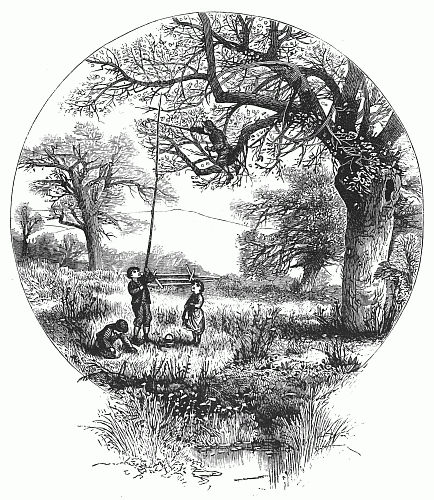
And what do you think? When we got there, not a nut was to be found! The little squirrels had been busy in our absence, and had taken away every one of them. Saucy squirrels! But we did not grudge them the nuts; for we had plenty.
I Want to tell the young folks who read "The Nursery" something of my visit to Florida last winter. We first went to Jacksonville, which lies on the St. John's River, and is a very pleasant city. I wish you would find it on the map.
One day, as I sat in the reading-room of the hotel, I heard shouts of laughter, followed by the clapping of hands. "What can it be?" thought I, throwing down the newspaper I was reading, and running into the corridor.
There I saw five or six little reptiles, about half the length of my arm, that seemed to be running a race over the canvas carpet with which the floor was covered. A number of people were looking on. They appeared to be highly amused by the queer movements of the creatures.[108]
"What are they? Lizards?" cried I.
"Lizards! No: they are young alligators," said a little girl, in a tone that implied pity for my ignorance.
"Alligators!" said I, retreating in alarm, as one of them came towards me.
"Oh, you coward!" cried the little girl, laughing. "They are too small to hurt you. See me." And, saying this, she took one of them up in her apron, and brought it towards me. I ran into the reading-room, and she ran after me; but when she saw that I was really afraid of the reptile, she took it back to the corridor, and placed it on the floor.
These little alligators grow to be huge creatures, sometimes more than twenty feet long. They live in the creeks and little rivers that run into the St. John's. They rarely go very far from the shore. They live partly on land and partly in the water.
In Florida the weather in January is often quite as warm as it is in the Northern States in June. So on a fine winter day, my father took my sister and me on board the steamer "Mayflower" for a trip upon the St. John's River, and up some of the small streams, where alligators may be found.
We went some thirty miles towards the south, and then turned into a small river, where the scenery on both sides resembled that given in the picture. Cypress-swamps and high trees overgrown with moss everywhere met our view. On the banks, and generally on fallen logs, might be seen alligators basking in the sun.
Many of the passengers in the steamboat had brought pistols and guns, with which to fire at the poor alligators. This is a very cruel and useless sport, for the alligators do no harm to anybody. I saw ladies and young girls firing at them. We passed some fifty alligators on our way.[109] Father and another gentleman took a boat, and rowed some distance up a creek. There we saw an alligator with a young one by its side. The young are very small, compared with the full-grown reptile. You can see from the picture, that the alligator is not handsome; but that is no reason why bullets should be lodged in its hide. I came to the conclusion that firing pistols at these animals was poor and mean sport. What a lovely day it was! and how we enjoyed the excursion! Just think of sitting in your summer clothing on a day in January, and passing through scenery where the trees and shrubs are all green. We returned to Jacksonville just in time to see the sun set, and we shall not soon forget our visit among the alligators.
Uncle Charles's Nephew. |
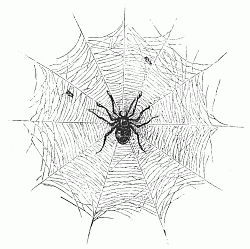
Every child has seen spiders in plenty, spinning their webs in some corner; or, after the web or tent is securely fastened and finished, lying in wait for some unfortunate fly or mosquito.
Oftentimes in these webs small brown bags are to be seen, and these, if opened, will be found to contain a great many little eggs which the spider has laid; or, sometimes when you open them, you will find that the eggs have just hatched, and that there is a bag full of tiny spiders that have not yet seen the light.
Spiders indeed have as many children sometimes as the "Old woman who lived in a shoe;" but, unlike that famed personage, they seem to know just what to do. It is very interesting to watch them, and see how they manage their little ones.
One day as I was walking on a country road, where there was not much travel, my attention was caught by a large spider in the dust at my feet, so large that I stopped to look at it. Its body seemed rough and thick, while its legs were short. I took a stick, and poked it, when, presto change! my spider had a small, round, smooth body, and long legs.
Truly this was more strange than any sleight-of-hand trick I had ever seen. I had heard of snakes and frogs shedding their skins, and many other queer stories of animals and insects, but of nothing at all like this.[111]
I stooped closer to the ground to see if I could get a clew to the mystery, and found that the dust all about the large spider was alive with little ones that she had just shaken off. What a load! And how did they ever get up on her back? Did they run up her slender legs, and crowd and cling on?
How I wished I knew the spider language, that I might find out why this mother weighed herself down with such a burden of little ones as she walked the street! Was she giving them an airing, and showing them the world? or had the broom of some housemaid swept away her web, and forced her thus to take flight to save her family from destruction?
Perhaps she had been burned out. Or was it the first day of May to her? and had her landlord forced her out of her house because she could not pay the rent?
Alas! she could not tell me; and I left her there in the road with all her little ones about her.
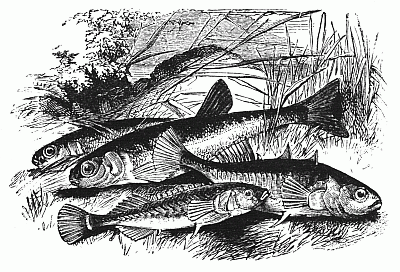
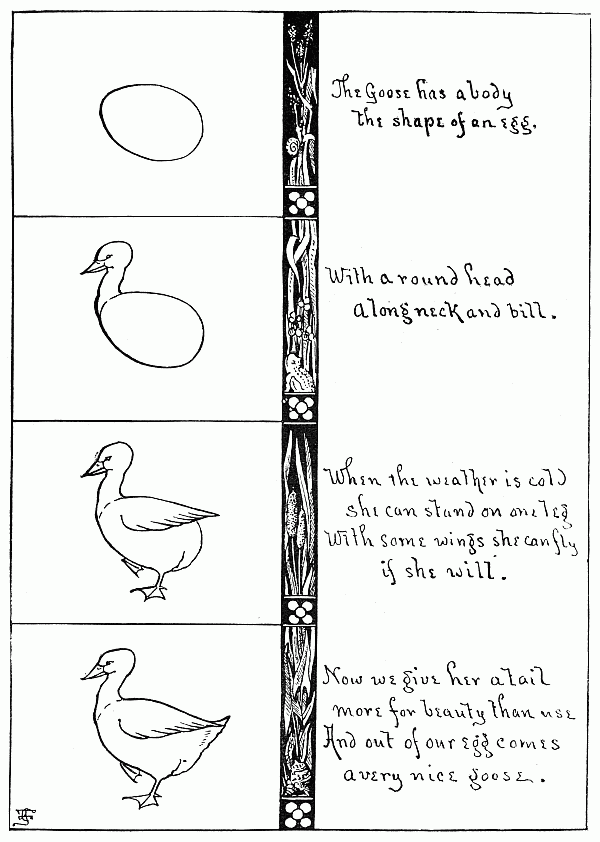
Many years ago, when I was a little fellow, I went on a sail with my Uncle Ralph on one of the prettiest of our northern lakes. The day was fine, the air was mild but fresh, and the hills and banks around us were clothed in green.
Besides Uncle Ralph, in the boat were my Aunt Mary, and cousins Walter and Susan Brent. Uncle Ralph was a sportsman, and he had a gun, with which he hoped to bring down a deer, in case he should see one.
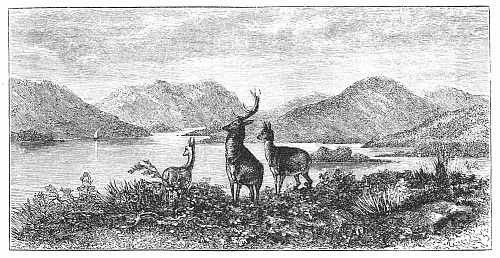
I did not at all like this part of his plan. I knew it would mar my own and my aunt's pleasure, if we were made to see the death of a noble stag or a gentle fawn. But I was too fond of a sail to express my dislike of Uncle Ralph's plan.
At the foot of a hill we stopped in our little boat to pick berries. Aunt Mary said she would stay and read. The rest of us went with Uncle Ralph to a clearing near by, to pick raspberries.[114]
We had not been gone long, when Uncle Ralph sent me back for a mug with which to get water from a cool spring. As I came within sight of the boat, I saw Aunt Mary take the ramrod of the gun, extract the bullet, and then put in fresh wadding, and ram it down.
I understood it all, but said nothing. After we had got berries and water enough, we set sail again, and this time for the opposite shore, where Uncle Ralph's keen eyes had detected a stag and two fawns.
We landed in a little cove out of sight of the deer. Uncle Ralph took his gun, and crept through the woods. In about fifteen minutes we heard him fire. Aunt Mary smiled, and took up her book. Soon Uncle Ralph came back.
"Where's your game, Ralph?" asked Aunt Mary.
"Will you believe it," said he: "I got within thirty feet of them; had the fairest shot that a fellow could possibly have, but somehow I missed my aim—didn't so much as graze one of them."
"Well, I'm not sorry for it," said Aunt Mary. "We shall enjoy our luncheon under the trees all the better."
I looked at her, and laughed, but she checked me with a "Hush!"
Mr. Baxter, a poor laboring-man, was the owner of a fine dog, whose name was Dandy. Having to remove from one village to another in the State of Maine, Mr. Baxter hired a small wagon on which his furniture was packed. Then he led the horse, while Dandy followed behind.
When he came to the place where he was to stop, Mr. Baxter unloaded his wagon, but was sorry to find that a[115] chair and a basket were missing from the back-part of the wagon, and that Dandy, also, could not be found. The day passed; and, as the dog did not appear, the poor man feared that something must have happened to him.
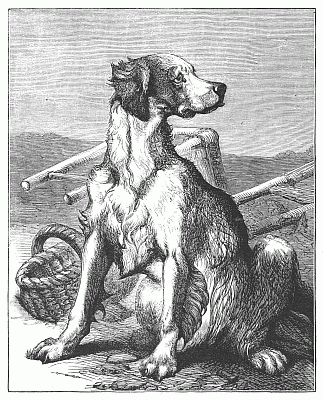
The next day, as Mr. Baxter was on his way back to the old cottage to take away another load, he heard the bark of[116] a dog, which sounded very much like Dandy's. Judge how glad he was when he saw by the roadside, not only his lost property, but his faithful Dandy, seated erect by the chair and basket, keeping strict guard over them.
They had fallen from the wagon when Mr. Baxter was not looking; but Dandy had seen them, and, like a good dog, felt it his duty to stay behind and guard what belonged to his master.
Although left for so long a time without food, the faithful creature had never quitted the spot where the chair and basket had fallen. But, when he saw his master, how glad was poor Dandy! He leaped up, put his paws on the man's shoulders, and barked with joy.
"Good Dandy! good Dandy!" said Mr. Baxter: "you must be hungry, old fellow! Come along: you shall have a good dinner for this. While I have a crust of bread, I'll share it with you, you noble old dog."
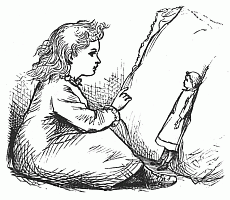
Emma has placed her doll Flora against the pillow. She says, "Now, dear Flora, I want you to be very good to-morrow, for I am to have company. It is my birthday."
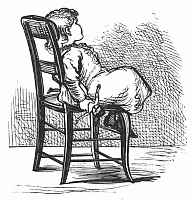
Then Emma sat down in a chair, and said to herself, "Why, what an old person I shall be! I shall be four years old; and I shall have to go to school soon, and read in my books. I love to look at the pictures now."
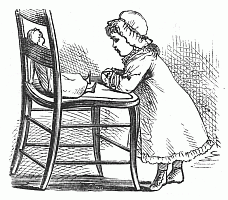
Emma got down from the chair, and placed Flora in it, and said: "I want you to be very still now, my child, for I am going to say my evening prayers. You must not cry; you must not stir; for I shall not like it at all if you make the least noise."
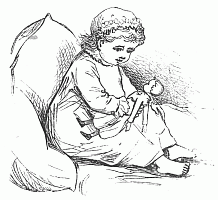
Then Emma said her prayers, and Flora kept quite still all the while. "Now I shall take off my shoes, and get into bed," said Emma; and then she thanked Flora for behaving so well.
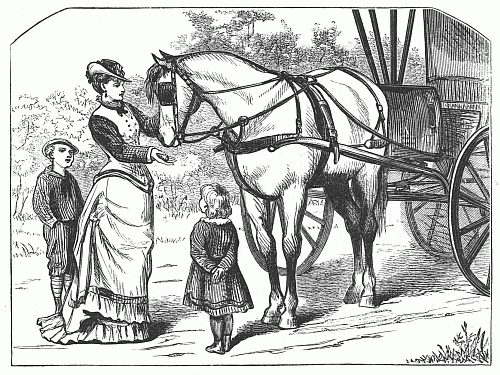
We call him old Billy; but he is not really old: he is a young horse, and as full of capers as any puppy. After he has been standing in the barn for two or three days, he acts like a wild creature when he is taken out, and will whisk round corners, and scamper up and down the hill, as if he really meant to tear every thing to pieces. But just fill the carriage up with ladies or babies, and he will step along as carefully as if he thought an extra joggle would break some of them.
He is very fond of my aunt, who usually drives him; and, when she goes to ride, he always expects her to give him something good,—an apple, or a crust, or a lump of sugar. If she has nothing for him, he will grab the corner of her veil, or the ribbons on her hat, and chew them, to teach[120] her not to forget him next time; and he will lap her face and hands, like a dog.
If she goes into a store, and stays longer than he thinks necessary, he will step across the sidewalk, carriage and all, and try to get his head in at the door to look for her.
There is another horse in the barn where he is kept,—a very quiet, well-behaved nag, named Tom; and sometimes, when Billy feels naughty, he will put his head over the side of the stall and nip Tom, not enough to hurt much, but just enough to tease him, and make him squeal.
One day auntie heard a great clattering in the barn, and went out to see what was the matter. When she opened the door, both horses were in their stalls, and all was quiet. She noticed that the meal-chest was open: so she closed it, and went out. Before she reached the house, the noise began again, and she went quietly back, and peeped in at the window.
There was Billy, dipping his nose into the meal-chest, which he had opened. "Billy, what are you doing?" said auntie; and it was fun enough to see him whisk into his stall, and stand there as quiet and demure as a cat that had just been caught eating up the cream.
Billy had slipped the halter, and so set himself free. Since then he has been fastened more securely; yet he still succeeds in freeing himself once in a while.
The cuckoo is a queer bird. It arrives in England about the middle of April, and departs in the autumn for the woods of Northern Africa. In every language the well-known notes of the male bird have suggested its name.[121]
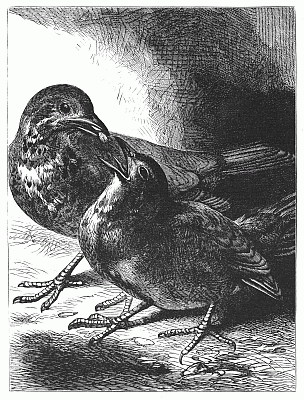
In its habits it is shy; and its voice may be often heard whilst the eye seeks in vain to find the bird itself. Its food consists of caterpillars and various insects.
The female cuckoo makes no nest, and takes no care of[122] her young. How do you suppose she does? Having a wide bill, she takes up in it one of her eggs, which she puts in the nest of some other bird that feeds on insects.
The strange nurses to whom the cuckoo confides her young become not only good mothers to them, but neglect their own children to take care of the young cuckoos.
As the young cuckoo thrives and grows strong, he thrusts the other birds out of the nest, so that he may have all the room to himself. For five weeks or more his adopted mother supplies him with food.
In the picture a thrush is represented as feeding a young cuckoo, that has probably driven off all the thrush's own children.
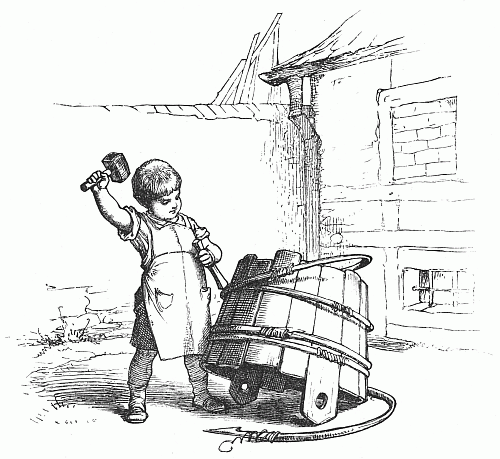
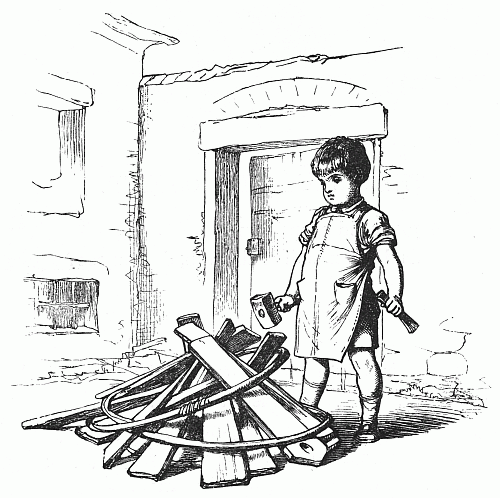
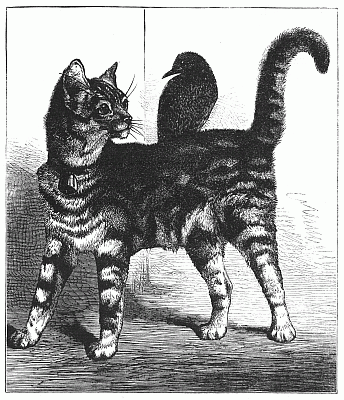
The European starling is a sprightly and handsome bird, about eight inches long, of a black color with purple and greenish reflections, and spotted with buff. It may be taught to repeat a few words, and to whistle short tunes.
A little boy in England, who had one as a pet, which he named Dicky, tells the following story about it:[126]—
"I took it home with me, and got a cage for it. But Master Dicky was not satisfied with so little room, and got out, and took possession of the whole house. One morning I was awakened by his chirping, and, on looking around, I saw him on my pillow, to which he used to come every morning.
"We had at the same time a cat, with whom he soon became very good friends. They always drank milk out of the same saucer. One afternoon, a basin of milk being on the table, Master Dicky thought he would take a bath: so in he went, splashing the milk all over the table.
"Sometimes he would take it into his head to have a ride on the cat's back, to which she had no objection. At night he would sleep with the cat and kitten; and once when the servant came down in the morning, she said that she saw the cat with her paw around the bird, keeping him warm, though that seems almost too much to believe."
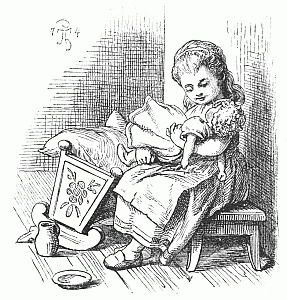
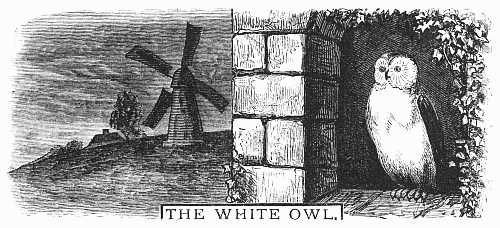
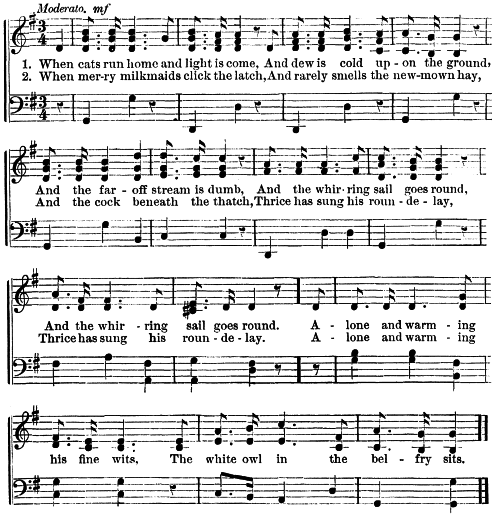
The July edition of the Nursery had a table of contents for the next six issues of the year. This table was divided to cover each specific issue. A title page copied from this same July edition was also used for this number and the issue number added after the Volume number.
Page 114, "go" changed to "got" (After we had got)
Page 128, period changed to a comma on chorus of song (his fine wits,)
End of the Project Gutenberg EBook of The Nursery, October 1877, Vol. XXII.
No. 4, by Various
*** END OF THIS PROJECT GUTENBERG EBOOK THE NURSERY, OCTOBER 1877 ***
***** This file should be named 28138-h.htm or 28138-h.zip *****
This and all associated files of various formats will be found in:
http://www.gutenberg.org/2/8/1/3/28138/
Produced by Emmy, Juliet Sutherland and the Online
Distributed Proofreading Team at http://www.pgdp.net. Music
by Linda Cantoni.
Updated editions will replace the previous one--the old editions
will be renamed.
Creating the works from public domain print editions means that no
one owns a United States copyright in these works, so the Foundation
(and you!) can copy and distribute it in the United States without
permission and without paying copyright royalties. Special rules,
set forth in the General Terms of Use part of this license, apply to
copying and distributing Project Gutenberg-tm electronic works to
protect the PROJECT GUTENBERG-tm concept and trademark. Project
Gutenberg is a registered trademark, and may not be used if you
charge for the eBooks, unless you receive specific permission. If you
do not charge anything for copies of this eBook, complying with the
rules is very easy. You may use this eBook for nearly any purpose
such as creation of derivative works, reports, performances and
research. They may be modified and printed and given away--you may do
practically ANYTHING with public domain eBooks. Redistribution is
subject to the trademark license, especially commercial
redistribution.
*** START: FULL LICENSE ***
THE FULL PROJECT GUTENBERG LICENSE
PLEASE READ THIS BEFORE YOU DISTRIBUTE OR USE THIS WORK
To protect the Project Gutenberg-tm mission of promoting the free
distribution of electronic works, by using or distributing this work
(or any other work associated in any way with the phrase "Project
Gutenberg"), you agree to comply with all the terms of the Full Project
Gutenberg-tm License (available with this file or online at
http://gutenberg.org/license).
Section 1. General Terms of Use and Redistributing Project Gutenberg-tm
electronic works
1.A. By reading or using any part of this Project Gutenberg-tm
electronic work, you indicate that you have read, understand, agree to
and accept all the terms of this license and intellectual property
(trademark/copyright) agreement. If you do not agree to abide by all
the terms of this agreement, you must cease using and return or destroy
all copies of Project Gutenberg-tm electronic works in your possession.
If you paid a fee for obtaining a copy of or access to a Project
Gutenberg-tm electronic work and you do not agree to be bound by the
terms of this agreement, you may obtain a refund from the person or
entity to whom you paid the fee as set forth in paragraph 1.E.8.
1.B. "Project Gutenberg" is a registered trademark. It may only be
used on or associated in any way with an electronic work by people who
agree to be bound by the terms of this agreement. There are a few
things that you can do with most Project Gutenberg-tm electronic works
even without complying with the full terms of this agreement. See
paragraph 1.C below. There are a lot of things you can do with Project
Gutenberg-tm electronic works if you follow the terms of this agreement
and help preserve free future access to Project Gutenberg-tm electronic
works. See paragraph 1.E below.
1.C. The Project Gutenberg Literary Archive Foundation ("the Foundation"
or PGLAF), owns a compilation copyright in the collection of Project
Gutenberg-tm electronic works. Nearly all the individual works in the
collection are in the public domain in the United States. If an
individual work is in the public domain in the United States and you are
located in the United States, we do not claim a right to prevent you from
copying, distributing, performing, displaying or creating derivative
works based on the work as long as all references to Project Gutenberg
are removed. Of course, we hope that you will support the Project
Gutenberg-tm mission of promoting free access to electronic works by
freely sharing Project Gutenberg-tm works in compliance with the terms of
this agreement for keeping the Project Gutenberg-tm name associated with
the work. You can easily comply with the terms of this agreement by
keeping this work in the same format with its attached full Project
Gutenberg-tm License when you share it without charge with others.
1.D. The copyright laws of the place where you are located also govern
what you can do with this work. Copyright laws in most countries are in
a constant state of change. If you are outside the United States, check
the laws of your country in addition to the terms of this agreement
before downloading, copying, displaying, performing, distributing or
creating derivative works based on this work or any other Project
Gutenberg-tm work. The Foundation makes no representations concerning
the copyright status of any work in any country outside the United
States.
1.E. Unless you have removed all references to Project Gutenberg:
1.E.1. The following sentence, with active links to, or other immediate
access to, the full Project Gutenberg-tm License must appear prominently
whenever any copy of a Project Gutenberg-tm work (any work on which the
phrase "Project Gutenberg" appears, or with which the phrase "Project
Gutenberg" is associated) is accessed, displayed, performed, viewed,
copied or distributed:
This eBook is for the use of anyone anywhere at no cost and with
almost no restrictions whatsoever. You may copy it, give it away or
re-use it under the terms of the Project Gutenberg License included
with this eBook or online at www.gutenberg.org
1.E.2. If an individual Project Gutenberg-tm electronic work is derived
from the public domain (does not contain a notice indicating that it is
posted with permission of the copyright holder), the work can be copied
and distributed to anyone in the United States without paying any fees
or charges. If you are redistributing or providing access to a work
with the phrase "Project Gutenberg" associated with or appearing on the
work, you must comply either with the requirements of paragraphs 1.E.1
through 1.E.7 or obtain permission for the use of the work and the
Project Gutenberg-tm trademark as set forth in paragraphs 1.E.8 or
1.E.9.
1.E.3. If an individual Project Gutenberg-tm electronic work is posted
with the permission of the copyright holder, your use and distribution
must comply with both paragraphs 1.E.1 through 1.E.7 and any additional
terms imposed by the copyright holder. Additional terms will be linked
to the Project Gutenberg-tm License for all works posted with the
permission of the copyright holder found at the beginning of this work.
1.E.4. Do not unlink or detach or remove the full Project Gutenberg-tm
License terms from this work, or any files containing a part of this
work or any other work associated with Project Gutenberg-tm.
1.E.5. Do not copy, display, perform, distribute or redistribute this
electronic work, or any part of this electronic work, without
prominently displaying the sentence set forth in paragraph 1.E.1 with
active links or immediate access to the full terms of the Project
Gutenberg-tm License.
1.E.6. You may convert to and distribute this work in any binary,
compressed, marked up, nonproprietary or proprietary form, including any
word processing or hypertext form. However, if you provide access to or
distribute copies of a Project Gutenberg-tm work in a format other than
"Plain Vanilla ASCII" or other format used in the official version
posted on the official Project Gutenberg-tm web site (www.gutenberg.org),
you must, at no additional cost, fee or expense to the user, provide a
copy, a means of exporting a copy, or a means of obtaining a copy upon
request, of the work in its original "Plain Vanilla ASCII" or other
form. Any alternate format must include the full Project Gutenberg-tm
License as specified in paragraph 1.E.1.
1.E.7. Do not charge a fee for access to, viewing, displaying,
performing, copying or distributing any Project Gutenberg-tm works
unless you comply with paragraph 1.E.8 or 1.E.9.
1.E.8. You may charge a reasonable fee for copies of or providing
access to or distributing Project Gutenberg-tm electronic works provided
that
- You pay a royalty fee of 20% of the gross profits you derive from
the use of Project Gutenberg-tm works calculated using the method
you already use to calculate your applicable taxes. The fee is
owed to the owner of the Project Gutenberg-tm trademark, but he
has agreed to donate royalties under this paragraph to the
Project Gutenberg Literary Archive Foundation. Royalty payments
must be paid within 60 days following each date on which you
prepare (or are legally required to prepare) your periodic tax
returns. Royalty payments should be clearly marked as such and
sent to the Project Gutenberg Literary Archive Foundation at the
address specified in Section 4, "Information about donations to
the Project Gutenberg Literary Archive Foundation."
- You provide a full refund of any money paid by a user who notifies
you in writing (or by e-mail) within 30 days of receipt that s/he
does not agree to the terms of the full Project Gutenberg-tm
License. You must require such a user to return or
destroy all copies of the works possessed in a physical medium
and discontinue all use of and all access to other copies of
Project Gutenberg-tm works.
- You provide, in accordance with paragraph 1.F.3, a full refund of any
money paid for a work or a replacement copy, if a defect in the
electronic work is discovered and reported to you within 90 days
of receipt of the work.
- You comply with all other terms of this agreement for free
distribution of Project Gutenberg-tm works.
1.E.9. If you wish to charge a fee or distribute a Project Gutenberg-tm
electronic work or group of works on different terms than are set
forth in this agreement, you must obtain permission in writing from
both the Project Gutenberg Literary Archive Foundation and Michael
Hart, the owner of the Project Gutenberg-tm trademark. Contact the
Foundation as set forth in Section 3 below.
1.F.
1.F.1. Project Gutenberg volunteers and employees expend considerable
effort to identify, do copyright research on, transcribe and proofread
public domain works in creating the Project Gutenberg-tm
collection. Despite these efforts, Project Gutenberg-tm electronic
works, and the medium on which they may be stored, may contain
"Defects," such as, but not limited to, incomplete, inaccurate or
corrupt data, transcription errors, a copyright or other intellectual
property infringement, a defective or damaged disk or other medium, a
computer virus, or computer codes that damage or cannot be read by
your equipment.
1.F.2. LIMITED WARRANTY, DISCLAIMER OF DAMAGES - Except for the "Right
of Replacement or Refund" described in paragraph 1.F.3, the Project
Gutenberg Literary Archive Foundation, the owner of the Project
Gutenberg-tm trademark, and any other party distributing a Project
Gutenberg-tm electronic work under this agreement, disclaim all
liability to you for damages, costs and expenses, including legal
fees. YOU AGREE THAT YOU HAVE NO REMEDIES FOR NEGLIGENCE, STRICT
LIABILITY, BREACH OF WARRANTY OR BREACH OF CONTRACT EXCEPT THOSE
PROVIDED IN PARAGRAPH F3. YOU AGREE THAT THE FOUNDATION, THE
TRADEMARK OWNER, AND ANY DISTRIBUTOR UNDER THIS AGREEMENT WILL NOT BE
LIABLE TO YOU FOR ACTUAL, DIRECT, INDIRECT, CONSEQUENTIAL, PUNITIVE OR
INCIDENTAL DAMAGES EVEN IF YOU GIVE NOTICE OF THE POSSIBILITY OF SUCH
DAMAGE.
1.F.3. LIMITED RIGHT OF REPLACEMENT OR REFUND - If you discover a
defect in this electronic work within 90 days of receiving it, you can
receive a refund of the money (if any) you paid for it by sending a
written explanation to the person you received the work from. If you
received the work on a physical medium, you must return the medium with
your written explanation. The person or entity that provided you with
the defective work may elect to provide a replacement copy in lieu of a
refund. If you received the work electronically, the person or entity
providing it to you may choose to give you a second opportunity to
receive the work electronically in lieu of a refund. If the second copy
is also defective, you may demand a refund in writing without further
opportunities to fix the problem.
1.F.4. Except for the limited right of replacement or refund set forth
in paragraph 1.F.3, this work is provided to you 'AS-IS' WITH NO OTHER
WARRANTIES OF ANY KIND, EXPRESS OR IMPLIED, INCLUDING BUT NOT LIMITED TO
WARRANTIES OF MERCHANTIBILITY OR FITNESS FOR ANY PURPOSE.
1.F.5. Some states do not allow disclaimers of certain implied
warranties or the exclusion or limitation of certain types of damages.
If any disclaimer or limitation set forth in this agreement violates the
law of the state applicable to this agreement, the agreement shall be
interpreted to make the maximum disclaimer or limitation permitted by
the applicable state law. The invalidity or unenforceability of any
provision of this agreement shall not void the remaining provisions.
1.F.6. INDEMNITY - You agree to indemnify and hold the Foundation, the
trademark owner, any agent or employee of the Foundation, anyone
providing copies of Project Gutenberg-tm electronic works in accordance
with this agreement, and any volunteers associated with the production,
promotion and distribution of Project Gutenberg-tm electronic works,
harmless from all liability, costs and expenses, including legal fees,
that arise directly or indirectly from any of the following which you do
or cause to occur: (a) distribution of this or any Project Gutenberg-tm
work, (b) alteration, modification, or additions or deletions to any
Project Gutenberg-tm work, and (c) any Defect you cause.
Section 2. Information about the Mission of Project Gutenberg-tm
Project Gutenberg-tm is synonymous with the free distribution of
electronic works in formats readable by the widest variety of computers
including obsolete, old, middle-aged and new computers. It exists
because of the efforts of hundreds of volunteers and donations from
people in all walks of life.
Volunteers and financial support to provide volunteers with the
assistance they need, are critical to reaching Project Gutenberg-tm's
goals and ensuring that the Project Gutenberg-tm collection will
remain freely available for generations to come. In 2001, the Project
Gutenberg Literary Archive Foundation was created to provide a secure
and permanent future for Project Gutenberg-tm and future generations.
To learn more about the Project Gutenberg Literary Archive Foundation
and how your efforts and donations can help, see Sections 3 and 4
and the Foundation web page at http://www.pglaf.org.
Section 3. Information about the Project Gutenberg Literary Archive
Foundation
The Project Gutenberg Literary Archive Foundation is a non profit
501(c)(3) educational corporation organized under the laws of the
state of Mississippi and granted tax exempt status by the Internal
Revenue Service. The Foundation's EIN or federal tax identification
number is 64-6221541. Its 501(c)(3) letter is posted at
http://pglaf.org/fundraising. Contributions to the Project Gutenberg
Literary Archive Foundation are tax deductible to the full extent
permitted by U.S. federal laws and your state's laws.
The Foundation's principal office is located at 4557 Melan Dr. S.
Fairbanks, AK, 99712., but its volunteers and employees are scattered
throughout numerous locations. Its business office is located at
809 North 1500 West, Salt Lake City, UT 84116, (801) 596-1887, email
business@pglaf.org. Email contact links and up to date contact
information can be found at the Foundation's web site and official
page at http://pglaf.org
For additional contact information:
Dr. Gregory B. Newby
Chief Executive and Director
gbnewby@pglaf.org
Section 4. Information about Donations to the Project Gutenberg
Literary Archive Foundation
Project Gutenberg-tm depends upon and cannot survive without wide
spread public support and donations to carry out its mission of
increasing the number of public domain and licensed works that can be
freely distributed in machine readable form accessible by the widest
array of equipment including outdated equipment. Many small donations
($1 to $5,000) are particularly important to maintaining tax exempt
status with the IRS.
The Foundation is committed to complying with the laws regulating
charities and charitable donations in all 50 states of the United
States. Compliance requirements are not uniform and it takes a
considerable effort, much paperwork and many fees to meet and keep up
with these requirements. We do not solicit donations in locations
where we have not received written confirmation of compliance. To
SEND DONATIONS or determine the status of compliance for any
particular state visit http://pglaf.org
While we cannot and do not solicit contributions from states where we
have not met the solicitation requirements, we know of no prohibition
against accepting unsolicited donations from donors in such states who
approach us with offers to donate.
International donations are gratefully accepted, but we cannot make
any statements concerning tax treatment of donations received from
outside the United States. U.S. laws alone swamp our small staff.
Please check the Project Gutenberg Web pages for current donation
methods and addresses. Donations are accepted in a number of other
ways including checks, online payments and credit card donations.
To donate, please visit: http://pglaf.org/donate
Section 5. General Information About Project Gutenberg-tm electronic
works.
Professor Michael S. Hart is the originator of the Project Gutenberg-tm
concept of a library of electronic works that could be freely shared
with anyone. For thirty years, he produced and distributed Project
Gutenberg-tm eBooks with only a loose network of volunteer support.
Project Gutenberg-tm eBooks are often created from several printed
editions, all of which are confirmed as Public Domain in the U.S.
unless a copyright notice is included. Thus, we do not necessarily
keep eBooks in compliance with any particular paper edition.
Most people start at our Web site which has the main PG search facility:
http://www.gutenberg.org
This Web site includes information about Project Gutenberg-tm,
including how to make donations to the Project Gutenberg Literary
Archive Foundation, how to help produce our new eBooks, and how to
subscribe to our email newsletter to hear about new eBooks.